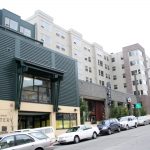The SCIDpda stands in solidarity with The National Coalition for Asian Pacific American Community Development (National CAPACD) and organizations around the world advocating for an immediate and permanent ceasefire in Gaza and the West Bank.
While the SCIDpda primarily operates within the Chinatown International District (CID) in Seattle, the CID itself is populated by many ethnic communities shaped by forced displacement, whether due to wars abroad or locally due to the racist and historic harms inflicted upon communities of color in the U.S. The SCIDpda is inextricably aligned with the plight of refugees globally, often welcoming immigrants who have been forced to flee their country into our neighborhood’s community.
The families and individuals living in the SCIDpda’s housing are largely immigrants and refugees. We, as an organization, are committed to housing and fostering a sense of belonging for these communities in our part of the world. As such, we affirm the inherent right of every community anywhere to live in safety and dignity in their places of belonging.
We call upon our local, state, and federal leaders to join us in urging for an immediate and permanent ceasefire in Gaza.
National CAPACD Call for Permanent Ceasefire in Gaza & Solidarity with Impacted Communities
SCIDpda is a coalition member of National CAPACD, who released the following statement:
Over the past two months, National CAPACD has watched, in horror, the unprecedented devastation and violence in Gaza, the West Bank, and Israel, which has led to the death and displacement of thousands of civilians, refugees, and children. National CAPACD opposes all acts of terror, and we stand unequivocally for the inherent right of all communities to live in safety and dignity in their places of belonging. Asian American, Native Hawaiian, and Pacific Islander (AA and NHPI) communities know, too well, the violence of war and conflict that have separated our ancestors from their lands. Rooted in the lessons of our own histories and struggles, we join the global call for a permanent ceasefire.
We are also witnessing the impacts of this crisis spill over into our neighborhoods, including multiple accounts of violence, harassment, censorship, and disinformation fueled by antisemitism and Islamophobia. We extend our wishes for a full recovery to the three college students of Palestinian descent who were targeted and shot in Vermont over the holiday weekend, and we continue to mourn the tragic murder of 6-year-old Wadea Al-Fayoume in Chicago. For our Muslim, Sikh, South Asian, West Asian, and Arab American community members who are still healing from the heightened levels of discrimination and violence post-9/11, this is all too familiar. Conflict manufactures division, which facilitates the dehumanization of entire communities. We cannot allow this to happen. Drawing from our collective efforts in response to 9/11 and crises since, we must mobilize to stand in solidarity with Muslim, Sikh, Jewish, South Asian, West Asian, and Arab American communities across the country.
Furthermore, we implore our leaders at the local, state, and national levels to denounce acts of hate, challenge messaging that spreads hateful rhetoric to divide our communities, and support efforts to challenge harm and violence against any targeted community. They must also affirm and protect our communities’ right to freedom of speech without censorship or retaliation, a principle enshrined in the United States’ rule of law – a right that has been challenged many times over the past several weeks. Finally, as a coalition committed to directing much-needed resources to low-income communities, we must urge federal leaders against divesting from critical domestic programs and services to bolster military aid – our taxpayer dollars should not further violence abroad.
In these troubling times, National CAPACD’s commitment is to serve as a source of support for our coalition members, and we ground this commitment in hope – hope for a permanent ceasefire in Gaza, hope in our shared liberation. We have tremendous power collectively, and we must work in solidarity, across issues and movements, toward a world for our future generations in which all communities have an inherent right to live safely, with dignity and without fear, in the places that are home to us.


